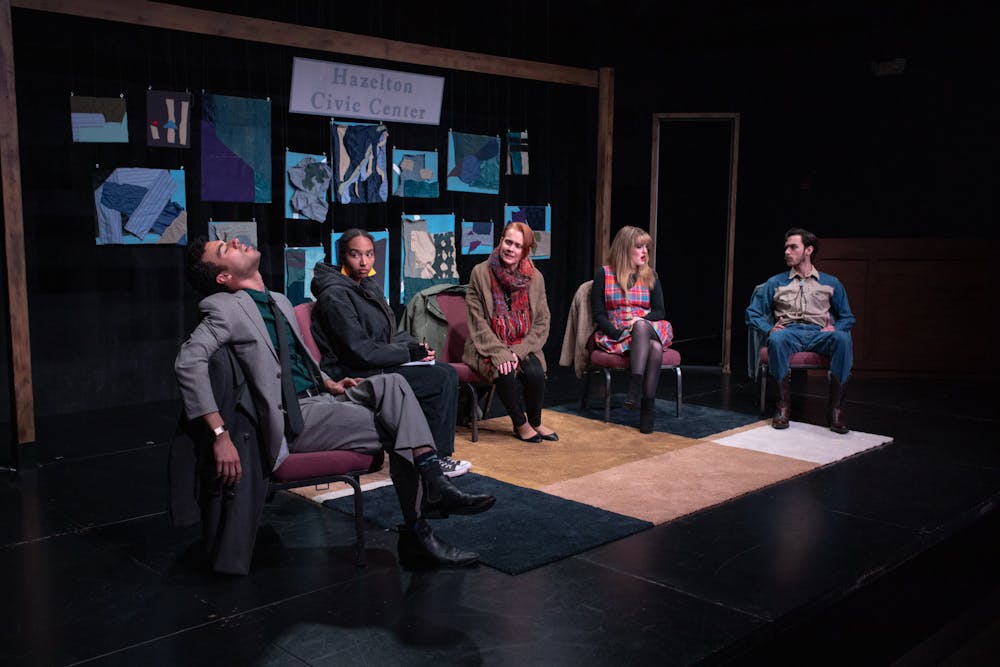Confabulation has appeared as part of a wave of new work—perhaps most popularly crystalized this year with Jane Schoenbrun’s I Saw the TV Glow, a parable of the horror of never coming out—which has finally gained the courage to treat queerness with a greater degree of allusion and allegory. After a long and sometimes grating infancy of obviousness, exposition, and simplistic narratives, this nascent subtlety could perhaps be taken to represent a welcome maturation of queer theater and film, which at long last feels equipped to go beyond the basic representation of our reality toward a deeper, more provocative territory.
The play centers upon a small town’s support group for “past–life regression,” a narrative and conceptual device which allows the play to freely explore, with some sobering honesty, some of the familiar traumas of queer life in a manner that sheds some new light. The characters, each with their own painful past, are supposed to gain a new tranquility and self–understanding by reliving their past lives, but the result for the audience is instead unsettling.
What initially appears as a baffling error—the fact that the actors do not change their performance as they change character in these scenes, as they adopt the roles of other people from another’s character’s past—becomes a masterful stroke, as it becomes apparent that the roles are not so much switched–between as they are combined. An actor will at once be both their original character and another character’s sister, or portraying both a character’s brief lover and, separately, the victim of their past violence.
The web of questions, connections and possible interpretations that build from these lacunae and narrative confusions facilitate a deeper exploration of, for instance, the sensation of being feared, the desperate need for recognition paired with the discomfort of being truly seen, and the internalized sting of humiliation (and the eruptions of violence that can follow it). By not only swapping actors between roles but also destabilizing the very coherence of said roles and the boundaries between them, the play is able to explore, for example, the relationship between victim and victimized in ways that feel genuinely challenging. Everyone, to some extent, seems to be or have been at some point everyone else, and so each carries with them a number of different and sometimes conflicting perspectives.
None of this is to say that Confabulation, a new play by an emerging playwright, is without flaws. It suffers, particularly in the first half, from sluggish pacing, with some scenes that serve seemingly little narrative purpose dragging far beyond their welcome. While the surreal humor did elicit frequent laughs, and some of the tonal shifts into the play’s heavier material were well executed, the dialogue as a whole at times felt weak and superficial next to the play’s genuinely novel framing and ideas. The language, though occasionally bursting into pithy phrases of real force, often felt too flimsy for the context in which it was spoken, which included striking lighting effects and a quite sophisticated set design (with a backdrop that develops symbolically as the narrative progresses).
None of these gripes outweigh my gratitude for the play’s refreshing ambition, and the young cast does very well in their execution of even the weaker parts of the script. Its final image is genuinely moving and defies easy interpretation. That the play is uneven does not negate the power of its strongest scenes, which are engaging enough to forgive its slow start.
The Strides Collective, which produced the play, is guided by the mission of developing new queer theatrical talent—and it is the only such organization in the Philadelphia area. As an incubator of new storytellers, which are especially vital at a time of renewed and mounting hostility to LGBTQ+ people and their portrayal, this project is nothing short of miraculous. Any queer theatergoer would be making a mistake not to attend this world premiere. The play’s merit and strong cast are certainly enough to deserve a hearing, but supporting this project is another compelling reason to show up.
Art like this, which articulates the sometimes visceral, sometimes joyful features of marginalized queer life has a renewed urgency. This is not just a matter of humanizing us to the mainstream, as previous waves of queer theater and film have emphasized, but rather—as Confabulation reminds us—it is also a matter of holding a consoling mirror up to our chaotic lived reality so that we can learn, a little better, how to help each other care, love, and endure.

